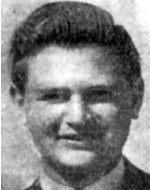Segalson, Elchanan (Eilon)
Son of Ra’aya and Shmuel, was born in Kaunas, Lithuania on June 16, 1929. He completed elementary school, was active in the student work for the Jewish National Fund and demanded that his parents immigrate to Israel. At 10 years old, he joined the Betar movement. The peak of his dreams was to see the establishment of a Jewish army in an independent Palestine and he expressed a burning willingness to sacrifice his life for the liberation of the homeland. During the Soviet occupation at the beginning of the Second World War he continued Zionist activity in the underground.
Elchanan immigrated to Israel with the whole family on the ship “Wedwood”. On June 26, 1946, the British Royal Navy attacked the ship while entering the port of Haifa and its passengers were transferred to a detention camp in Atlit. A few days later, Elchanan met the detainees of the “Black Sabbath,” who were also brought there. After his discharge from the camp, he arrived in Tel Aviv and joined the Irgun underground in the name of “Ayalon.” He worked as a clerk in the Ramat Gan Council and later in Nechushtan in Tel Aviv, and spent the evening and rest days devoted to training and activities. In the wake of the UN General Assembly resolution on the partition of the country, Elchanan took part in the defense of the Tel Aviv suburbs and at his request participated in the Irgun’s attack on Manshiyya and its conquest, and was one of the first intruders to the front positions on the shores of Tel Aviv. As the fighting intensified, Elchanan became a full-time officer of the Irgun. Two hours before the start of the first truce, when the Jewish fighters were forced to retreat from the enemy’s surplus forces in people and equipment, he remained with another officer in an extreme position to cover up the retreat, despite the opposition of his comrades. On the 4th of Sivan 5712 (11.6.1948), Elchanan fell. (5.6.1952), and on the 12th of Sivan, he was laid to rest with the rest of the victims of this battle in a mass grave in the Kiryat Shaul military cemetery.
See Hebrew side for full history.
